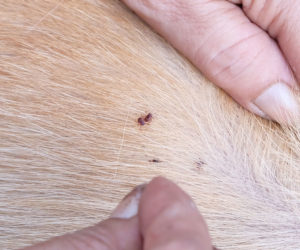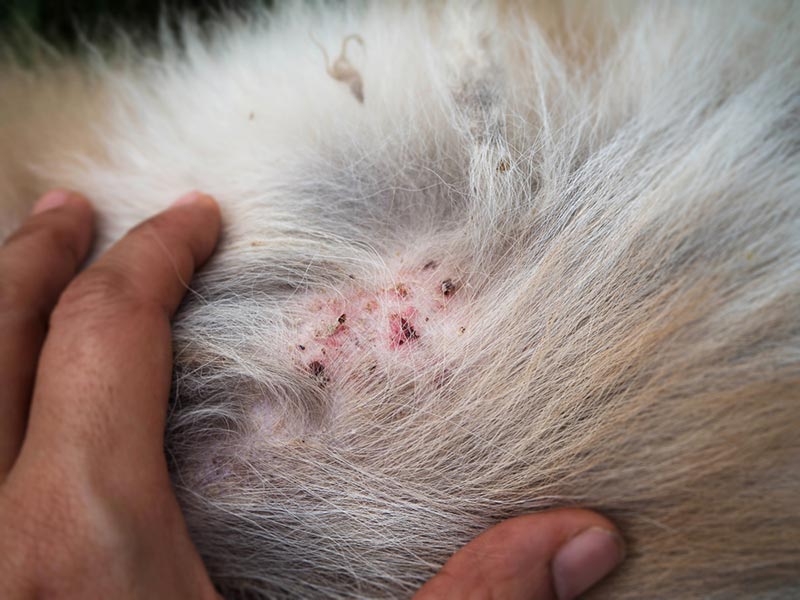Fleas on a young and vulnerable puppy can be a heart-wrenching experience for any dog owner. Witnessing your precious little companion succumb to the relentless itching and irritation caused by these tiny parasites is enough to make any heart break. If you find yourself in this situation, know that you’re not alone. Fleas are a common problem for puppies, and with the right knowledge and prompt action, you can help your furry friend overcome this discomfort and restore their well-being.

Image: animalia-life.club
Understanding Fleas: The Tiny Parasites Infesting Your Puppy
Fleas are wingless insects that feed on the blood of mammals, including dogs and cats. These tiny pests are reddish-brown in color and measure about 2-3 millimeters in length. Fleas have a flattened body that allows them to easily move through your puppy’s fur and burrow into the skin. They have strong legs that enable them to jump significant distances, often landing on your puppy from your carpet, furniture, or even other pets.
Female fleas can lay up to 50 eggs per day, which quickly leads to an infestation if not addressed promptly. The eggs hatch into larvae that feed on organic matter in your home, such as pet dander or food debris. The larvae spin cocoons to transform into pupae, and within a few weeks, they emerge as adult fleas, ready to start the cycle anew. This rapid reproduction rate makes flea infestations a challenge to manage.
Recognizing the Signs of Fleas on Your Puppy
The most obvious sign of fleas on your puppy is excessive itching. Fleas inject saliva into your puppy’s skin when they bite, causing intense irritation and allergic reactions in some dogs. Your puppy may scratch and bite at their fur relentlessly, leading to hair loss, skin irritation, and even open wounds.
Other signs of a flea infestation include:
- Visible fleas or flea droppings (small, black specks) in your puppy’s fur or on their bedding
- Red or inflamed skin
- Restlessness or difficulty sleeping due to the constant itching
- Anemia, especially in severe infestations, due to excessive blood loss
- Tapeworm infection, as fleas can carry and transmit tapeworms to your puppy
Treating Fleas on Your 8-Week-Old Puppy
Treating fleas on an 8-week-old puppy requires a gentle yet effective approach. Some over-the-counter flea treatments contain harsh chemicals that may be too strong for a young puppy’s delicate system. Consulting with a veterinarian is highly recommended to determine the safest and most appropriate treatment option for your puppy.
Generally, veterinarians may recommend spot-on treatments that are applied directly to your puppy’s skin between the shoulder blades. These treatments typically contain insecticides that kill fleas and prevent new infestations for several weeks. Additionally, oral medications may be prescribed if the infestation is severe.

Image: thegioiloaimeo.com
Preventing Flea Re-infestation
Once you’ve successfully treated your puppy for fleas, preventing re-infestation is crucial. Here are some effective measures you can take:
- Regularly vacuum your home, especially in areas where your puppy spends most of their time, to remove fleas, eggs, and larvae
- Wash your puppy’s bedding, blankets, and toys in hot water to kill any remaining fleas
- Treat all other pets in your household for fleas as they may harbor fleas or eggs
- Apply a flea prevention treatment to your puppy on a regular basis, as recommended by your veterinarian
Fleas On A Puppy 8 Weeks Old
Conclusion: Restoring Your Puppy’s Comfort and Well-being
Fleas on a puppy can be a distressing experience, but with prompt action and the right treatment, you can help your furry companion regain their comfort and well-being. Remember to consult with a veterinarian for the safest and most effective treatment options for your puppy’s age and health condition. Taking the necessary steps to prevent re-infestation will ensure that your puppy can enjoy a healthy and flea-free life.


/GettyImages-1303637-two-way-mirror-57126b585f9b588cc2ed8a7b-5b8ef296c9e77c0050809a9a.jpg?w=740&resize=740,414&ssl=1)


